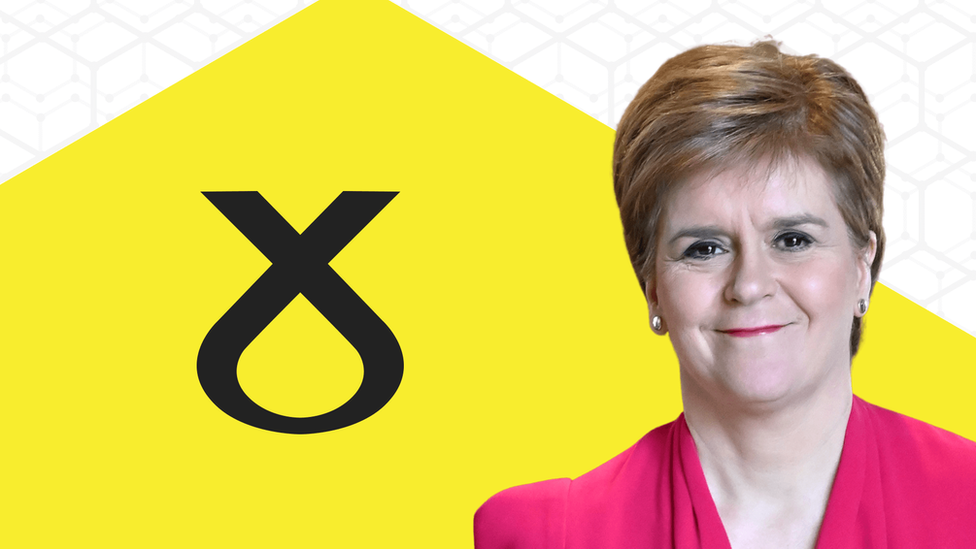Scottish election 2021: A simple guide to the SNP
- Published
The Scottish National Party is currently the largest party in the Scottish Parliament, with 61 MSPs out of 129 seats.
The SNP has formed the devolved Scottish government in Edinburgh since 2007 and wants Scotland to become an independent country.

SNP leader Nicola Sturgeon
Who is the leader?
Nicola Sturgeon, who is also Scotland's first minister. The 50-year-old former solicitor was elected to the Scottish Parliament when it opened in 1999, and became the SNP's deputy leader under Alex Salmond in 2004. Following the SNP's victory in the Holyrood election three years later, Ms Sturgeon also became deputy first minister and the Scottish government's health secretary. She played a key role in the Yes campaign during the 2014 Scottish independence referendum, and succeeded Mr Salmond as both SNP leader and first minister when he quit after the referendum.

SCOTLAND ALERTS: Get extra updates on BBC election coverage

What do they need to do to win the election?
The SNP need 65 MSPs to form a majority government, which means they need a further two members elected in addition to their 2016 total to reach this number. At the 2016 Scottish election, the party lost its position as a majority government but did not make a coalition deal. Instead they choose to govern as a minority government and rely on the support of other parties to pass legislation. It will be aiming to win another overall majority this time.
Key Policies
Hold a second referendum on Scottish independence
Build 100,000 new homes by 2032, with at least 70% of these being for social rent
Launch a National Care Service
Oppose nuclear weapons
Provide ScotRail services within the public sector
Where do they stand on independence?
The SNP supports Scottish independence. Scotland held a vote on independence in 2014 - when 55% of voters rejected independence. The issue was thrust back into the limelight again in 2016 when the UK voted to leave the EU. Although the UK-wide vote was 52% to 48% in favour of Brexit, the result was very different in Scotland, where it was 62% to 38% in favour of Remain.
The day after the referendum, Nicola Sturgeon said the situation was a "democratic outrage" and that another independence vote was "highly likely".
The SNP set out a "roadmap to a referendum" on Scottish independence in January, laying out how they intend to take forward their plans for another vote. It says a "legal referendum" will be held after the pandemic if there is a pro-independence majority at Holyrood following May's election.
The 11-point plan says it will "vigorously oppose" any legal challenge from the UK government. Boris Johnson has repeatedly stated his opposition to another referendum.
SNP policy in a tweet
Allow X content?
This article contains content provided by X. We ask for your permission before anything is loaded, as they may be using cookies and other technologies. You may want to read X’s cookie policy, external and privacy policy, external before accepting. To view this content choose ‘accept and continue’.
What is the SNP's history?
The Scottish National Party was formed in 1934, when the National Party of Scotland and the Scottish Party merged. It won its first seat in the House of Commons in 1945, when Robert McIntyre won the Motherwell by-election in April before losing the seat in the general election in July of the same year. The party has been continuously represented in the Commons since Winnie Ewing famously won the Hamilton by-election in 1967.
The party won its first Scottish Parliament election in 2007, when it formed a minority government under Alex Salmond, before becoming the first party to win a majority at Holyrood four years later. It again formed a minority government after the 2016 election.
The SNP's biggest success in a Westminster election came when it won 56 seats in 2015. The party won 48 seats in the 2019 Westminster election, taking 45% of the vote in Scotland.
What about the other parties?


Do you have a question about the Scottish Parliament election? Use the form below to send us your questions and we could be in touch.
In some cases your question will be published, displaying your name, and location as you provide it, unless you state otherwise. Your contact details will never be published. Please ensure you have read the terms and conditions.
If you are reading this page on the BBC News app, you will need to visit the mobile version of the BBC website to submit your question on this topic.

- Published19 April 2021

- Published14 April 2021

- Published14 April 2021

- Published16 April 2021
